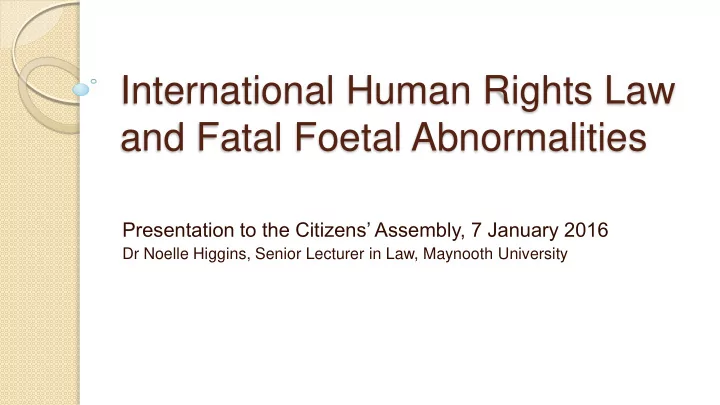

International Human Rights Law and Fatal Foetal Abnormalities Presentation to the Citizens’ Assembly, 7 January 2016 Dr Noelle Higgins, Senior Lecturer in Law, Maynooth University
Overview 1. Sources of Irish Law 2. EU Law and the Charter of Fundamental Rights 3. The Irish Legal System and International Law 4. The European Convention on Human Rights 5. The International Covenant on Civil and Political Rights
Sources of Law EU Law * Constitution Legislation Common Law International Law*
Charter of Fundamental Rights EU law is a primary source of law in Ireland and it takes precedence over domestic Irish law The Charter has the same legal value as the EU Treaties in member States and it is binding on Ireland BUT t he Charter will only apply where a question of EU law arises When the Charter does apply, it is directly applicable by Irish courts and will take precedence over domestic law if there is a conflict The Court of Justice will apply the Charter where a fundamental rights issue arises and these decisions are binding on Ireland
Ireland and International Law Article 29(6) Irish Constitution ◦ Even if Ireland has ratified an international agreement, it is directly applicable unless the Oireachtas incorporates it into domestic law ◦ Normally by passing a piece of legislation. Even if an international agreement is not incorporated into domestic law, it is still binding on the State. ◦ If Irish law is in conflict with an international agreement, Ireland can be found by an international court to have breached international law.
European Convention on Human Rights ECHR has been indirectly incorporated in Irish Law by ECHR Act 2003 ◦ Section 2(1) of Act requires Irish courts to interpret rules of domestic law in a manner which is in line with the State’s obligations under the Convention. ◦ Section 4 of the Act requires Irish courts to take account of judgments of the European Court ◦ Irish Courts can issue a declaration of incompatibility European Court of Human Rights ◦ Cases may be brought by individuals and groups against their own State before the European Court ◦ Exhaustion of domestic remedies ◦ States are obliged to abide by the judgments of the court ◦ A State may be required to change its laws and / or make reparations (e.g. pay compensation) to an individual whose rights were violated, e.g. A, B and C v Ireland
International Covenant on Civil and Political Rights Ireland has ratified but not incorporated ICCPR into domestic law Ireland has acceded to First Optional Protocol to ICCPR ◦ Allows individuals to complain to Human Rights Committee about alleged violations by State ◦ Committee is not a Court but Article 2(3) of the ICCPR requires ratifying States to provide victims of violations of the Covenant with an effective remedy and reparation
Mellet v Ireland Human Rights Committee found that Ireland had violated Article 7 (right to be free from cruel, inhuman or degrading treatment), Article 17 (right to privacy), and Article 26 (right to equality before the law) of the ICCPR. The Committee highlighted that under Article 2(3)a of the Covenant Ireland has an obligation to provide an effective remedy to Ms Mellet as a victim of human rights violations The State offered Ms Mellet an ex gratia sum of € 30,000 and access to appropriate psychological treatment
Recommend
More recommend